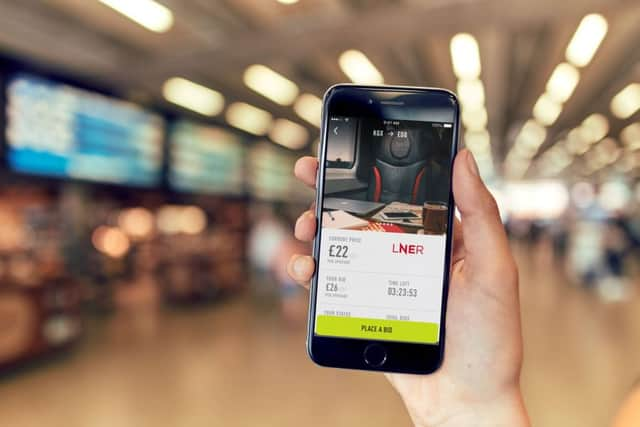How to get a first class train upgrade on your phone


Seatfrog is what is known in the business community as a disrupter – a company from outside that turns conventional thinking on its head. In this case, it does so by applying a principle that has held true for years on the airlines – that untaken seats in the first class compartment can be profitably exploited by letting them go for a discount at the last minute.
This has the effect of lowering the bar for first class travel – something that sits uneasily among with those paying full price but is embraced by rank and file travellers.
Advertisement
Hide AdAdvertisement
Hide AdSeatfrog is a sort of eBay on rails, allowing passengers to bid for first class upgrades from £5, by joining online auctions two-and-a-half hours before their train departs.
Typically, an upgrade costs more than the minimum amount, but far less than the published fare. It means that the passenger prepared to pay the most for a seat gets to sit on it.
The benefits are considerable: first class compartments have come a long way since the days of British Rail, when an antimacassar on the seat was the only distinguishing factor. They are less crowded, the seats are wider and free tea, coffee and usually food is brought to your seat. The wi-fi is free, too.
You can’t use Seatfrog on local trains because those in the North don’t have first class sections. It also does not yet extend to the middle-distance TransPennine Express line. But on the main Yorkshire to London route, currently operated by the publicly-owned LNER, and on the west coast main line to Euston, an app lets you enter your booking reference and tells you know what upgrades are available for your trip – whether the seats are at a table or a window and which way they’re facing. If you like the look of them, you can bid for as many as you need for your party, by setting the maximum amount you’re prepared to pay. Your bid is hidden from other travellers.
Advertisement
Hide AdAdvertisement
Hide AdIf you win, a barcode is sent to your phone for the ticket inspector to scan; if you’re outbid, you pay nothing.
It seems like a radical reinvention of rail policy, and many travellers will indeed secure deals that would not previously have been available. But there are few transactions more complicated than buying a train ticket, with a myriad of confusing names and restrictions, and Seatfrog does little to simplify that side of things. It also has a few conditions of its own: on LNER you need to have booked a “standard advance” ticket and not an off-peak, super off-peak, anytime, open return, season ticket or family return. And upgrades are currently available only on certain services and not at weekends, when train companies offer their own upgrades.
The industry’s confusing pricing structure also means that the saving on Seatfrog may sometimes only be marginal, because at certain times of the day, a guaranteed first class seat from York to London is only £23 more than a standard one. At other times, it’s around three times as much.
That may change soon; tickets have long been a subject of ridicule, and the national review of the railways, commissioned in the wake of last year’s timetable chaos, is likely to recommend sweeping changes. In the meantime, Seatfrog is your best change of beating the system.